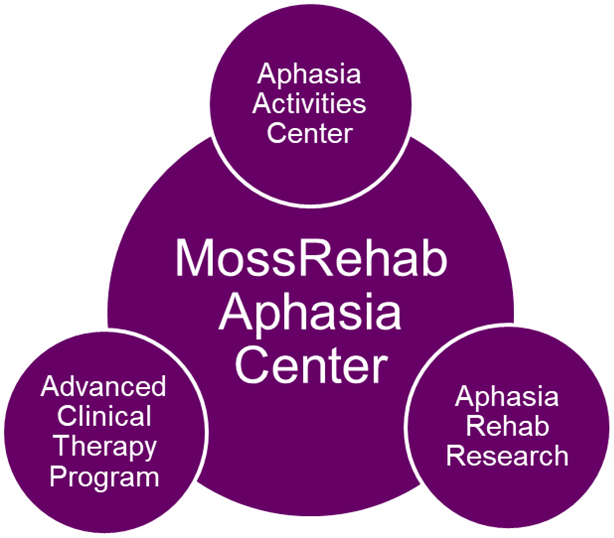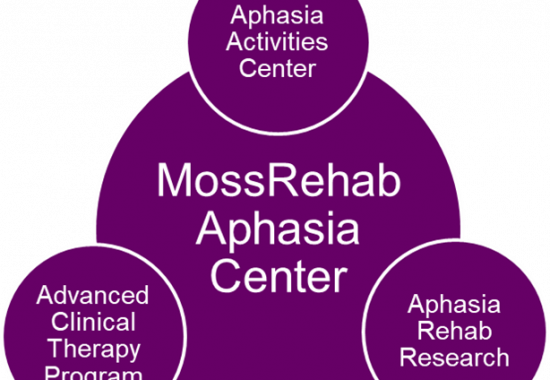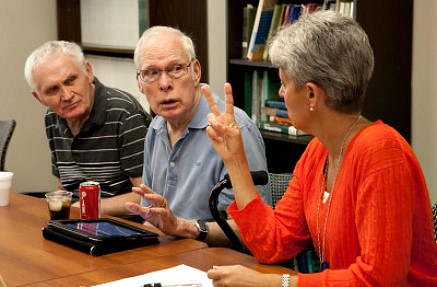Since opening its doors in 1996 as the third aphasia center in North America, MossRehab Aphasia Center has been a leader in aphasia rehabilitation. In recognition of National Aphasia Awareness Month, we are pleased to highlight the exceptional contributions of the Center.
The MossRehab Aphasia Center has been a pioneer in developing and implementing programs to address the long term communication and psychosocial needs of those living with aphasia (Fink & Schwarz, 2000). An early adopter of the Life Participation Approach to Aphasia (Chapey et al., 2001), the work of the Center has always been guided by several foundational principles:
- Recovery from aphasia involves a life-long process of re-education, adaptation, and support.
- Under the right conditions, people with aphasia can continue to recover even years after the onset of aphasia.
- Participating in social, recreational, and educational activities reduces isolation and helps people with aphasia and their families make psychosocial adjustments.
- Individuals with aphasia and their families can play an important role in increasing public awareness of aphasia.
Through the collaboration of founding directors, Myrna Schwartz, PhD (research director), and Ruth Fink, MA, CCC-SLP (clinical director), the Center has always been a place in which the convergence of scholarly and clinical innovation is the norm, a trajectory that continues today.
Through the integration of the Aphasia Activities Center, the Advanced Clinical Therapy Program, and ongoing aphasia rehabilitation research, the Center supports the continuum of communication needs of people with aphasia and their families. Access to cutting edge treatment has been brought into the homes and communities of those with aphasia, through early adoption of technology and through ‘outside the box’ approaches to targeting the psychosocial consequences of aphasia.

Social interaction facilitates rehabilitation. The Activities Center provides a variety of opportunities for engagement and conversation, activities that are therapeutic and life-enhancing. Group activities including Constance Sheerr-Kittner Conversation Cafés, Talking Book Club, and Reta’s Games Groups provide not only for practicing communication, but perhaps even more critically, for building friendships. Computer lab, technology workshops, and online resources such as the Aphasia Center Blog and library of video resources expand the reach of the Center beyond the space and provide additional ways for members to reach out into their communities.
The Advanced Clinical Therapy (ACT) Program
ACT is a specialized outpatient program bringing up-to-the-minute aphasia rehabilitation research into a clinical setting. Clinicians use this cutting edge research and computer technology to design a program for each individual that emphasizes effective home practice routines using computers whenever possible.
Aphasia Rehabilitation Research: Innovative Treatments
Scientific and clinical collaborations at the MossRehab Aphasia Center have facilitated the development of novel treatments, informed by cognitive neuropsychology and psycholinguistics, as well as by a person-centered approach to rehabilitation.
- MossTalk Words 2® is an evidence-based computer-assisted treatment program developed to strengthen understanding and production of single words for individuals with aphasia.
- Mapping Therapy (Schwartz et al., 1994) is a treatment for agrammatism that targets the ability to link grammatical constituents (subject, object) with thematic roles (agent, theme) to facilitate comprehension and production of language at the sentence level.
- The Persons with Aphasia Training Dogs (PATD) Program is a treatment designed to target the psychosocial consequences of aphasia by training participants in positive reinforcement dog training techniques that harness new skill learning and the advantages of human-animal interactions.
The Center has always maintained a commitment not only to developing the highest quality programs, but also to providing community leadership.
- Aphasia rehabilitation research evidence has been disseminated to scientific and consumer communities through more than 40 peer-reviewed publications and presentations based on work at the Center.
- As a founding member center of Aphasia Access and a member of the Aphasia Resource Collaboration Hub, the Center participates in local, national, and international education and advocacy efforts with healthcare professionals and community advocates around the world.
The clinicians, scientists, community advocates, donors, and most importantly, the members of the MossRehab Aphasia Center have contributed substantially for 25 years to research and rehabilitation. We look forward to continuing this innovation and person-centered service with the goal of supporting individuals and families in living well with aphasia.



15 comment on “A History of Pioneering Research and Clinical Care for People with Aphasia”